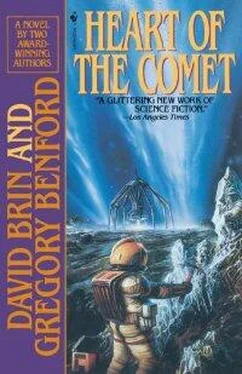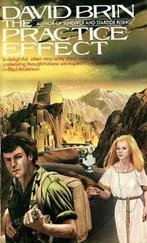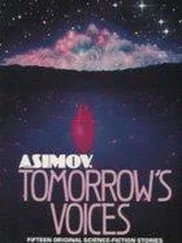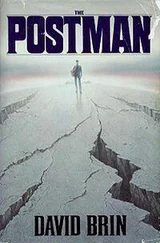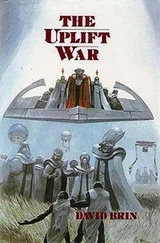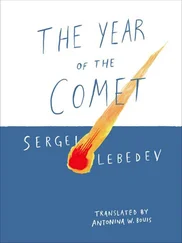As he approached, Saul wasn’t entirely sure of his own safety. For although the Arcist faction seemed to accept his neutrality, this man was his own force.
“Colonel Ould-Harrad.” He nodded, stopping ten feet away. Saul let his feet slowly come to rest on the floor, toes clutching the soft, hybrid, green covering.
“Do not call me that,” the African intoned with an upraised hand. “I am not an officer, nor spacer, nor Earthman any longer.”
Saul blinked. He had last glimpsed Ould-Harrad during than Great Exodus—his white spacesuit tabard centered with a single, jet-black starburst—leading the Arcist exiles on their trek while Quiverian and his crew covered the rear. During Saul’s brief, subsequent visits to the antipodes, their paths had never crossed. Still, he remembered something the man had said, so long ago, in his lab aboard the Edmund.
“He whom Allah chooses to touch, bears the ridges of those fingerprints, ever afterward…”
“Very well, Suleiman.” Saul nodded. “I see the otters are doing well.”
Ould-Harrad glanced down at the creatures. His hand gently stroked their glossy fur, gene-adapted for life in icy halls instead of the salt spume of the sea.
“One more time, you have proven me wrong about you, Saul Lintz. For the role you have played in bringing these fine creatures forth cannot have been evil.”
Saul couldn’t t help it. He felt a wash of relief at Ould-Harrad’s words, as if he had been worried about that very thing, and the man had the power to absolve. He is very good at this prophet shtick, Saul observed.
“Did Joao lend them to you while you came up north?”
Ould-Harrad’s eyes seemed to flash.
“They are no longer his to lend. That is one reason why I have sought you out. To tell you that there are only three monkeys, down in the south antipodes, to watch for purples and guard the people as they sleep. You must replace these otters.”
“Oh? Where are you taking them?”
“You deserve to know.” Ould-Harrad paused with a faraway look in his eyes. “For years I have gone out onto the surface and meditated under the stars, as mystics have since time immemorial, praying and hoping for a sign. I found that they were hypnotic, those glittering lights in the blackness. After a long time I thought that I had, indeed, begun to hear God’s voice.
“But it could not have been.”
“Why not?” Saul was curious.
Ould-Harrad’s voice was filled with pain. “Because all that came to me was laughter!”
Saul knew that this was more than mere madness. He could almost feel the intensity of the man’s soul torment. “I think I understand,” he said quietly. He did not add that he saw nothing inconsistent in the man’s experience. Who ever said the Creator must be sober? The universe is for laughing, or we must weep.
Ould-Harrad nodded. For a long moment there were no words. Then he raised his eyes again.
“There was another thing.”
“What was that?”
“I… I can no longer be a party to the schemes of Quiverian and his banal crew, they.”
“The Arcists?”
“Yes.” The beard floated as Ould-Harrad shook his head. His voice was barely audible. “The wars we brought with us from Earth are as the fog of summer, that will fall away and be forgotten with the coming of winter. I have come to realize that arguments over where to target this great, frozen teardrop miss the point entirely.”
“Where will you go, then?”
Ould-Harrad’s gaze dropped briefly to the floor. “I must go down…into the ice. Below where anyone has gone—except for Ingersoll, whom they now call the Old Man of the Caves, and those poor creatures who followed him. I will live on what grows, along their trail. I will minister to them, if they still live. And I will think.”
Saul nodded. Within Ould-Harrad’s world view, a hermitage made sense, obviously. He made no effort to dissuade the man. “I wish you luck. And wisdom.”
Ould-Harrad nodded. He looked down at his pets. “I am beginning to comprehend one aspect, at least… this thing you preach— this symbiosis. I did not understand at first, but now…”
He paused. “You are not doing evil, Saul Lintz. For that reason I warn you. Beware of Quiverian. He plans something. I know it. You, in particular, he wishes harm. And Carl Osborn.”
Saul did not know what to say. “I’ll be careful.”
“Care, or care not.” Ould-Harrad shrugged. “Do or do not. In the end, it is all by God’s will. We are helpless to resist.”
The otters seemed to sense something even before he moved. They leaped forth and flicked off down the long, dim hallway. Ould-Harrad turned stiffly and walked away.
He actually does seem to be walking, like onthe moon or onEarth, Saul thought as he watched the man depart. I wonder what his technique is.
He swiveled and glided back toward Blue Rock Cave, pondering the effects of personal gravity.
The blackness seemed like a solid weight a vast hand clasped about the gray, battered ice. Carl hadn’t been high above the surface for months, and the arid bleakness of it struck him fully, bringing back memories of his years when open silent vacuum meant freedom, deft movement, effortless grace.
Stars gleamed, their tiny brimming beacons of rose and sea azure and molten yellow shining like steady promises of another life— a realm filled with vibrant hues, a place beyond this bleak plain that the slow elliptical glide of orbit had drained of color.
Now the encroaching darkness meant that there was nothing between the frozen waste and the beckoning stars—no planets swarm with clouds and lightning, not even a vagrant asteroid within view.
They rode far below the ecliptic plane now, ten times farther from the disk of planets than Earth itself was from the sun. The outer solar system was vast beyond imagining. Carl looked toward the south, virtually all the solar system at his back. The sun’s dim radiance—a thousandth of that which warmed Earth—could not summon forth the full colors that marked the ice. Everywhere pools of shadow swallowed detail; most of Halley was an inky kingdom.
—Take it careful now,—Jeffers sent.
“Right,” Carl answered automatically, his reverie broken. He jetted down to alight near his friend. Together they glide-walked southward. Normally he would seek the polar cable and use a jet, be at the south pole in a few minutes. But these were not normal times.
They edged around the hummock of orange-splashed ice. Empty storage drums were moored with spiderweb-thin lines to the lump of frozen waste—garbage left from some process now decades old, forgotten. Jeffers slunk from one drum to another, careful not to expose himself to the southward side. Carl followed him. It took an effort to stay on the ice, gingerly digging his clamp-toes in for each long step. He fought down the urge to leap, to fly above the mottled snowscape.
Blithe spirit, he thought. That’s what i was once. Zipping around, all spit and vinegar. Carl Osborn, space daredevil. But now…it just doesn’t have thee same zest.
There were only a few paths that would not take them through the thick dust fields, kicking up plumes that would give their position away. Jeffers motioned to him and they sprinted across a patch of brown spill, running almost horizontally in long gliding steps, boots finding leverage on knobs and juts of ice. They reached the shelter of a chem module, a stained cylinder long sucked dry.
“They must be able to see us by now. I.”
—Shhhh! This close, they can pick up even local comm.—
Carl bent down for shelter, feeling mildly ridiculous. He glanced around the curved edge of the cylinder and took in what he could. Yes, definitely—new structures near the lips of the Nudge shafts. They looked makeshift, thrown together from old cargo canisters and struts. He could see nearly to the south pole itself. Neptune hung barely above the horizon, a faint green pinpoint.
Читать дальше
